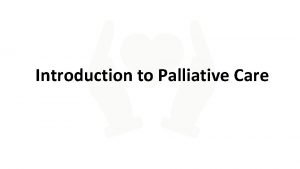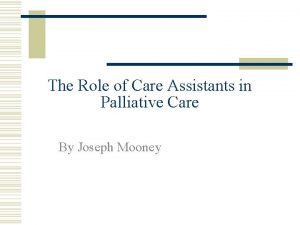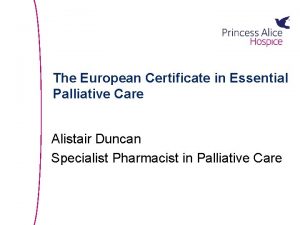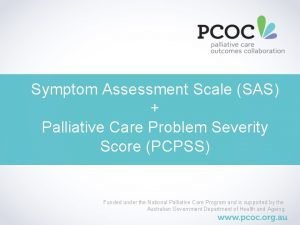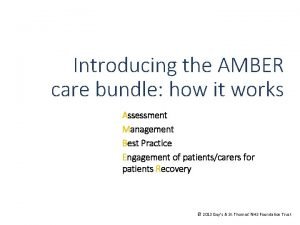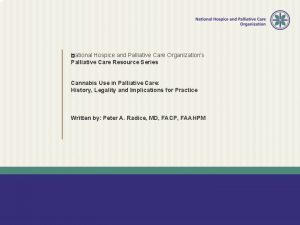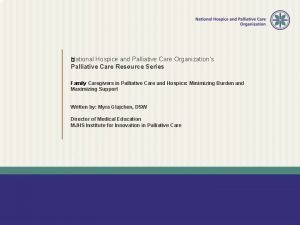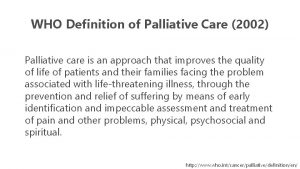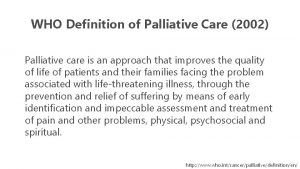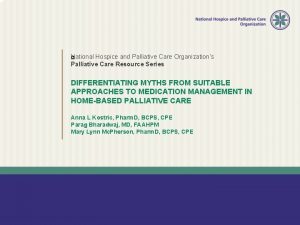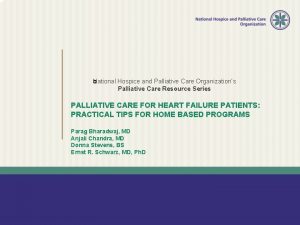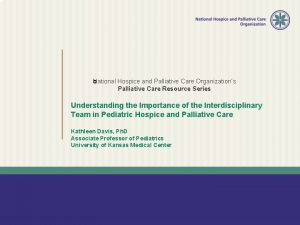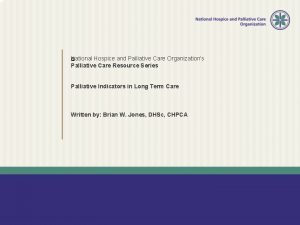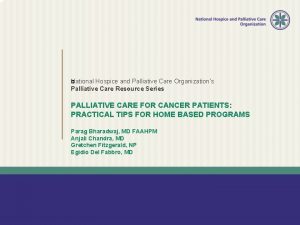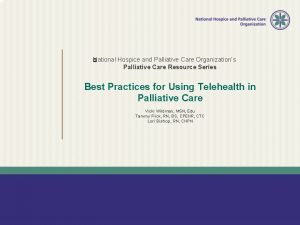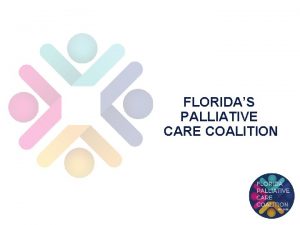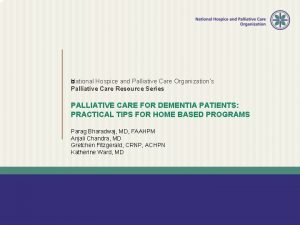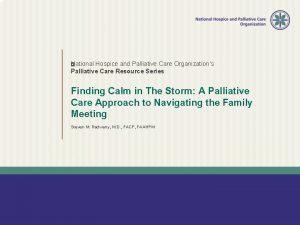PALLIATIVE CARE FOR HEALTHCARE ASSISTANTS YOUR ROLE Dr

























- Slides: 25

PALLIATIVE CARE FOR HEALTHCARE ASSISTANTS YOUR ROLE Dr. Catherine Buckley Ph. D, MSc, BSc, RGN

What is Palliative Care? “Palliative care is an approach that improves the quality of life of people and their families facing the problems associated with life-limiting illness, through the prevention and relief of suffering by means of early identification and impeccable assessment and treatment of pain and other problems, physical, psychosocial and spiritual”. (WHO, 2002) Version 1


Who Should Receive Palliative Care? All persons with a life-limiting illness irrespective of age, diagnosis or setting Version 1

Who Provides Palliative Care? Everyone working in a service that provides health and social care is obliged to understand provide a level of palliative care that uses palliative care principles and a palliative care approach


What is a Palliative Care Approach? § Recognises that death is inevitable § Provides opportunities for the person to make plans and set goals about their care § Includes the family, should the person wish, to be involved in planning for their care § Maximises the persons full potential and quality of life as defined by them

A core skill in health and social care and focuses on: § Promoting quality of life § Providing effective symptom control § Holistic approach that includes the person’s life experience and current situation § Care for the dying person and those who matter to the person § Open sensitive communication with the person, family/carers and colleagues

What are the Levels of Palliative Care Provision? • Level 1 – Palliative Care Approach: provided by all staff as part of their general role • Level 2 – General Palliative Care: provided by some with extra knowledge/education/skill as part of their general role • Level 3 – Specialist Palliative Care: provided by a few in a specialist palliative care role with specialist knowledge and skills

What is the Role of the Specialist Palliative Care Team? Act as a resource for other health and social care professionals in the area, by providing support and advice when needed. Provide facilities for research and education in palliative care. Provides support to families including bereavement support. Clinical management and care coordination including: triage, assessment and care planning for persons with complex care needs associated with life limiting illness and/or end of life


What is a Palliative Care Needs Assessment? A palliative care needs assessment is an individualised assessment of palliative care needs based on palliative care principles and the domains of palliative care Version 1

Domain 1: Physical Wellbeing Unique to the person and may require prompting to share Pain All forms of physical pain Fatigue not relieved by rest and not appropriate to level of activity Respiratory Breathless ness, cough, secretions Gastrointestinal Neurological Anorexia, nausea, vomiting, constipation Insomnia, confusion, delirium, anxiety, depression Other Functional status, balance problems, oedema, wound problems

Physical Wellbeing: Health Care Assistant Role When interacting and providing care: § Observe for signs of pain, discomfort, nausea, breathlessness or any evidence of distress and report to your team § Report promptly any complaints of pain, discomfort, nausea, breathlessness, constipation or any other distress § Following intervention observe for signs of symptom relief and report if symptoms persist . . and report back to the team

Assessing pain • P = pick up on mood changes • A = Asses verbal ques • I = Inspect facial expression's • N= Notice body language

What can you do as a healthcare assistant to identify pain • Report any behaviours to nurse, family, and GP. • Assessment begins by asking an individual about their pain because only the individual can determine how much pain they are experiencing, despite their cognitive impairment. • Consider, interventions that can be done by you, at the time of pain, ie Pressure care, hunger, hydration, distraction, oral care and reassurance. • Monitor for interventions that relieve or worsen pain.

Domain 2: Social and Occupational Wellbeing § Background § Family support § Emotional and social support § Practical concerns Version 1

Social and Occupational Wellbeing: Health Care Assistant Role When interacting and providing care: § Background Tell me about yourself: occupation, hobbies. Any concerns? § Family Support Who lives with you: adults, children, dependants. Any worries, concerns? § Emotional and Social Support Other supports: friends, neighbours, community nurse, home help. How often do you see people? § Mood Observe mood. § Practical Concerns Practical issues, coping at home, stairs, cooking, money worries. Any worries or concerns ? . . . and report back to the team

Domain 3: Psychological Wellbeing § Persons mood and interest § How the person adjusts to their illness § What gives the person strength § Total pain § Pre-existing mental illness Version 1

Psychological Wellbeing: Health Care Assistant Role When interacting and providing care observe, take note and consider gently exploring: § Mood and Interest Feeling down or bothered? Are you tense, frightened? § Adjustment to Illness Do you understand your illness? § Resources What/who is your support? § Total pain Pain that is more than physical e. g. emotional, spiritual § Co-morbid diagnosis Current or past history of mental illness . . . and report back to team

Domain 4: Spiritual Wellbeing People have many different understandings of the word spiritual and how it impacts on their lives. Version 1 When completing a spiritual assessment, assessors need to be aware of alternative terms i. e. faith, belief, philosophy, religion, inner strength.

Spiritual Wellbeing: Health Care Assistant Role When interacting and providing care: § Look around and see if the person has any pictures, ornaments, or religious symbols that you could use to open a conversation § If you see any religious symbols gently ask the person if their faith gives them strength § If no religious symbols gently enquire about source of inner strength § Don’t probe too much if the person seems distressed and report back to the team . . and report back to team


Finally On completion of your assessment or observation report any issues you have identified back to the team.

 Palliative care versus hospice care
Palliative care versus hospice care Esas-r tool
Esas-r tool Score de karnofsky
Score de karnofsky Hospice satisfaction survey
Hospice satisfaction survey Principles of palliative care
Principles of palliative care Palliative care in nepal
Palliative care in nepal Palliative care assistant
Palliative care assistant European certificate in palliative care
European certificate in palliative care Parallel planning palliative care
Parallel planning palliative care Franciscan palliative care
Franciscan palliative care Traduzione
Traduzione Sas scale
Sas scale Pcqc registry
Pcqc registry Nausea and vomiting in palliative care powerpoint
Nausea and vomiting in palliative care powerpoint Just in case bag palliative care
Just in case bag palliative care What is amber care
What is amber care Goscote palliative care centre
Goscote palliative care centre Palliative care at home barry
Palliative care at home barry Bluegrass hospice
Bluegrass hospice Calvary palliative care kogarah
Calvary palliative care kogarah Anorexia, nausea and vomiting
Anorexia, nausea and vomiting Palliative care matters
Palliative care matters Dr hong-phuc tran
Dr hong-phuc tran Goc palliative care
Goc palliative care National palliative care research center
National palliative care research center European delirium association
European delirium association
